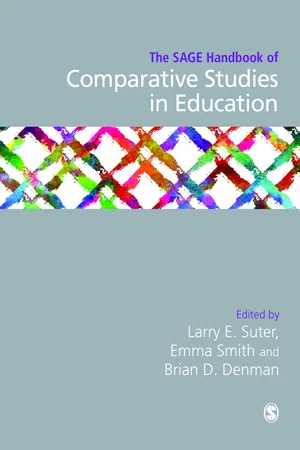
The SAGE Handbook of Comparative Studies in Education
- 682 pages
- English
- ePUB (mobile friendly)
- Available on iOS & Android
The SAGE Handbook of Comparative Studies in Education
About this book
Educational practices have rapidly changed in the last few decades, especially in how exchanges of information and learning are delivered and processed. Yet, while the field of international comparative studies has grown, there has not been an extensive study on the relationship between educational practices, students, and how practitioners are prepared and trained. This handbook explores international educational practices and behaviours through new research and a review of existing research, with chapters spread across six parts:
Part I: Introduction to Research Practices in Comparative Studies of Education
Part II: Research Methods
Part III: Policy Transfer Research through International Comparisons
Part IV: Use of Student time in Formal and Informal Settings
Part V: School Practices from Early Childhood through Secondary School
Part VI: Conclusion - Lessons from Large Scale Studies
Frequently asked questions
- Essential is ideal for learners and professionals who enjoy exploring a wide range of subjects. Access the Essential Library with 800,000+ trusted titles and best-sellers across business, personal growth, and the humanities. Includes unlimited reading time and Standard Read Aloud voice.
- Complete: Perfect for advanced learners and researchers needing full, unrestricted access. Unlock 1.4M+ books across hundreds of subjects, including academic and specialized titles. The Complete Plan also includes advanced features like Premium Read Aloud and Research Assistant.
Please note we cannot support devices running on iOS 13 and Android 7 or earlier. Learn more about using the app.
Information
Table of contents
- Cover
- Half Title
- Title Page
- Copyright Page
- Contents
- Illustration List
- List of Tables
- Notes on the Editors and Contributors
- Preface
- Methods and Practice in Comparative Education Research: Models, Ontologies and Epistemologies
- Part IThe Status of Comparative Education Research
- 1The Status of Comparative Education Research in the 21st Century: An Empiricist's View
- 2Critical Challenges in Approaches and Experience in Comparative Education Research
- 3Enduring Issues in Education: Comparative Perspectives
- 4Riddled with Gaping Wounds: A Methodological Critique of Comparative and International Studies in Education: Views of a Professor
- Part IIMeasurement Methods in Comparative Education Research
- 5Challenges in International Large-Scale Educational Surveys
- 6Non-Cognitive Attributes: Measurement and Meaning
- 7Methodological Challenges to Measuring Heterogeneous Populations Internationally
- 8The Participation of Latin American Countries in International Assessments: Assessment Capacity, Validity, and Fairness
- 9Validity Issues in Qualitative and Quantitative Research of Cross-National Studies
- 10Mixed Methods in Education: Visualising the Quality of Quantitative Data
- Part IIIResearch Practices in Comparative Studies of Education
- 11Growth and Development of Large-Scale International Comparative Studies and their Influence on Comparative Education Thinking
- 12The Meaning of Motivation to Learn in Cross-National Comparisons: A Review of Recent International Research on Ability, Self-Concept, and Interest
- 13Examining Change over Time in International Large-Scale Assessments: Lessons Learned from PISA
- 14Qualitative Comparative Education Research: Perennial Issues, New Approaches and Good Practice
- 15Methodological Challenges in Conducting International Research on Teaching Quality Using Standardized Observations
- 16The Measurement and Use of Socioeconomic Status in Educational Research
- Part IVLessons from International Comparisons of Student Behavior
- 17Early Childhood Care and Education in the Era of Sustainable Development: Balancing Local and Global Priorities
- 18Equity of Access to Pre-Primary Education and Long-Term Benefits: A Cross-Country Analysis
- 19Primary Education Curricula across the World: Qualitative and Quantitative Methodology in International Comparison
- 20Outside-School-Time Activities and Shadow Education
- 21Measuring Opportunity: Two Perspectives on the ‘Black Box’ of School Learning
- 22What Can International Comparative Tests Tell Us about the Future Supply of Highly Skilled STEM Workers?
- Part VInternational Comparisons of Instruction
- 23Comparative Research on Teacher Learning Communities in a Global Context
- 24Teaching Instructional Practices: Play-Based Learning – Supporting the Transition from Early Years to Primary Education
- 25Challenges in Practice: A Critical Examination of Efforts to Link Teacher Practices and Student Achievement
- 26Global Higher Education Trends: Implications for Policy and Practice
- 27Digital Technologies and Educational Transformation
- 28International Large-Scale Student Assessments and their Impact on National School Reforms
- Part VIInfluence of Large-Scale Assessments on Policy
- 29Changes in the World-Wide Distribution of Large-Scale International Assessments
- 30The Uneasy Relation between International Testing and Comparative Education Research1
- 31Global and Local Dissonance when Comparing Nation-States and Educational Performance
- 32Building Learning Assessment Systems in Latin America and the Caribbean
- Index